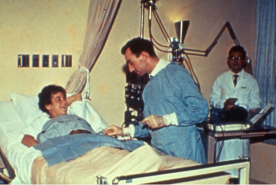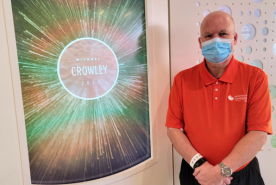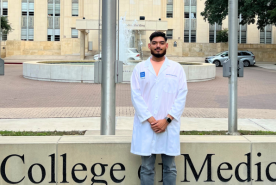By Carrie A. Schinstock, M.D.
Antibodies are important, right? Our immune system naturally forms antibodies as a protective response against bacteria and viruses. In the context of transplantation, antibodies are good when they are ready to attack foreign invaders that can lead to illness, but antibodies can also be ready to attack foreign tissue – such as a new kidney transplant. For this reason, antibodies towards different tissue types, otherwise known as anti- human leukocyte antigen donor specific antibodies (anti-HLA DSAs), are measured prior to transplantation. Having a high number of different antibodies towards different tissue types could mean that you are at high risk of rejection if you received a transplant from certain kidney donors. If you have antibodies against your particular kidney donor, the crossmatch will likely be positive (reactive) meaning that transplantation with that donor would be at high risk for rejection.
There are some frequently asked questions (FAQs) on the topic of antibodies and transplantation
Transplant Lingo 101: A Glossary of Commonly Used Terms
Negative cross-match kidney transplantation: Occasionally the levels of antibodies that you have against a particular kidney donor are very low. This results in a negative crossmatch when your blood and the donor white blood cells are mixed. In this scenario, it can be very safe for you to undergo transplantation and your kidney transplant will likely last for a long time.
Paired donation with a living donor: Because there are many patients with antibodies against their particular donor, pools of incompatible donors and recipients have been formed. Specialized programs and matching systems have been developed to take donors and recipients from these pools in order to create compatible matches. Some of these programs involve specific transplant centers and others are nationally-based. Talk with the staff from your transplant center about their paired donation programs.
Positive cross-match kidney transplantation: Occasionally, it is possible to undergo positive cross-match transplantation. In this case, you have antibodies towards your donor, but it is safe to cautiously undergo transplantation at a specialized transplant center with expertise in this particular area. You may need special treatments such as plasmapheresis and/or intravenous immunoglobulin (IVIG) to undergo this type of transplant. These are treatments that can remove antibodies. In select situations, positive crossmatch kidney transplantation is a better option than remaining on the deceased donor waiting list. For more information, visit a transplant center with expertise in this area.
Clinical trials: Experimental therapies to reduce donor specific antibody and/or treat rejection are available at certain transplant centers. Transplant centers with specialized interests in positive crossmatch kidney transplantation will usually have details about these clinical trials.
Our understanding of anti-HLA donor specific antibody and positive crossmatch kidney transplantation has increased considerably over the last 10 years, and more options are now available to patients with high antibodies than ever before. Researchers continue to work hard to overcome the antibody barriers to successful transplantation. If you have been told you have antibodies, before losing hope that you will never get a transplant, seek consultation with a transplant nephrologist or surgeon who specializes in this area.
To learn more about living donation and transplantation, visit our page on Transplant Education Programs.


















